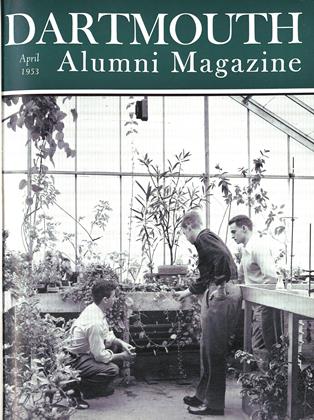The force of tradition is strong in New England, but it took a war and some long thinking on a destroyer in the Pacific to make William B. Rotch '37 sure that what he wanted most was to return to his hometown of Milford, N. H., and to run his father's, grandfather's, great, great-great and great-great-great grandfather's newspaper, the Milford Cabinet. Representing the sixth generation as editor, Bill Rotch has found that he chose not one job but many and that the office of a weekly newspaper is no place for a specialist. But he also discovered that there is no better way to know first-hand the life of a community.
The Milford Cabinet, which is now in its 151 st year of continuous publication, is called by its readers "an indispensable institution." Its editorial philosophy has been handed down by Bill Rotch's grandfather to Bill's father, Arthur B. Rotch '08: "Fulfill the needs of the community." Both Bill Rotch and his father, who now acts as associate editor, "turn the spotlight on local problems and try to round up material that will help the reader make reasonable decisions." They avoid expressing opinions on what they do not know much about and stick to what they do know. Arthur Rotch's column, "Observer," has been read faithfully for 43 years by his fellow townsmen, and it stands the test which is the demanding one of a small-town newspaper. As Arthur Rotch describes it, "Most people are going to be a lot more skeptical of a piece of writing when they know who wrote it."
In November 1802 Joseph Cushing founded the paper in Amherst, Mass. Then called the Farmer's Cabinet, it was sold seven years later to Richard Boylston, a journeyman printer. One of its newsboys, a lad named Horace Greeley, liked to hang around the shop while waiting for the papers he delivered to farmers near his own home. By the time that Edward Boylston became owner of the business in 1851 the Farmer's Cabinet had prospered, but with him the Boylston line "daughtered out." Albert A. Rotch, who had come to work on the paper, married his employer's daughter and in 1869 became associate editor; with his son, William Boylston Rotch, grandfather of the present owner, taking over in 1890. It was during this decade that the paper was moved to Milford, N. H., consolidated with the Milford Advance and the Wilton Journal, and named the Milford Cabinet.
After Arthur Rotch's graduation from Dartmouth in 1908, he joined his father in the business, eventually owning it. Arthur Rotch and his son were partners after the last war until January 1952, when Bill bought out his father's interest.
The commercial printing side of the business has long been the backbone of the paper, bringing in 50 per cent of the profits. Everything from menus to books are printed. The longest job in 1952 was a 436-page genealogy of the Jones family; the shortest, a sign reading MEN. There is no foreman in the press as most of the employees know their jobs too well to need one. Two years ago the paper was moved from its wooden building and housed in a brick one, originally a school. The machinery and other equipment are now too modern to recall the paper's long history. But the tradition of a small-town weekly paper still reigns. When there's a job to be done, everyone pitches in, and the Cabinet editor is seen writing, gathering news, selling advertising, cutting stock or running a folder.
As Bill Rotch said in a recent interview, "The Cabinet represents no miracle of production efficiency, but every Thursday 3,300 papers of 10 or 12 pages are printed and distributed. We experience the tribulations common to weeklies everywhere. We have known the frantic moments just before press time when it seems impossible that forms can be locked up in time to make the mails, and the staff have known the exhausted satisfaction, once the last paper is off the press, of saying 'Well, we did it again.' "
Recently president of the New Hampshire Weekly Publishers Association, Bill Rotch was of an editorial bent while at Dartmouth, and served as Undergraduate Editor of the ALUMNI MAGAZINE his senior year. From 1942 until 1944 he was Information Executive with the OPA in Concord, N. H. The father of three children, he hopes for a future editor of the MilfordCabinet from "this ample reserve."
CHECKING A FORM: Bill Rotch '37 and his father, Arthur Rotch 'OB, work together as edi- tor and associate editor of the Milford Cabinet
 View Full Issue
View Full Issue
More From This Issue
-
 Article
ArticleCatalysts for Democracy
April 1953 By RALPH A. BURNS '34h, -
 Class Notes
Class Notes1918
April 1953 By ERNEST H. EARLEY, RICHARD A. HOLTON -
 Article
Article1953 Alumni Fund Opens Campaign for $600,000
April 1953 -
 Class Notes
Class Notes1917
April 1953 By KARL W. KOENIGER, HOWARD A. STOCKWELL -
 Class Notes
Class Notes1929
April 1953 By F. WILLIAM ANDRES, GEORGE B. REDDING -
 Article
ArticleTHE COLLEGE
April 1953







